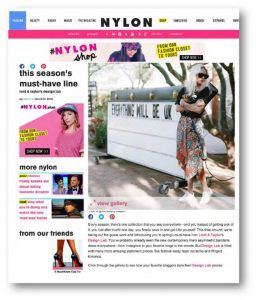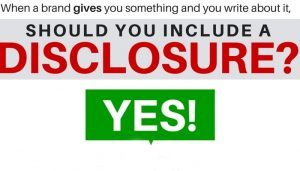
By Kerry Gorgone, {grow} Contributing Columnist
Influence marketing and native advertising are gaining popularity as brands continue to shift away from “interruption marketing” and embrace a more customer-centric approach. But in trying to sell without selling, it’s possible brands have made the “soft sell” a bit too soft, disguising advertising as organic influencer posts.
Smart marketers have been extra vigilant about disclosure since the Federal Trade Commission (“FTC”) issued an enforcement policy last December. Actually, the truly smart have been tightening up their own disclosure requirements since the FTC updated its online advertising disclosure guidelines in March 2013.
The threat’s been building for years
The agency’s been beating the drums for a while. Statements, letters and guidelines have warned marketers and bloggers of the oncoming campaign against sponsored content that doesn’t look sponsored: social media posts that don’t clearly state that they’re contest entries, influencer posts that don’t disclose that the influencer received compensation from the brand, etc..
Just ask Cole Haan. The company received a warning letter from the FTC in 2014 for its “wandering soles” campaign. The company encouraged consumers to create Pinterest boards and share Cole Haan’s pinned photos using the hashtag #wanderingsole in order to enter a contest. Most of the posts looked like organic social posts, because the company didn’t specify that people should disclose the underlying incentive—a chance to win a prize.
In that instance, Cole Haan got off with a warning, because the FTC acknowledged that it had “not previously publicly addressed whether entry into a contest is a form of material connection.” Well, now they have.
Fast forward to March 2016. Department store chain Lord & Taylor has just reached a settlement with the FTC after social posts and online articles generated for its native advertising and influencer campaigns were not clearly designated as sponsored content.
According to the FTC complaint, Lord & Taylor paid fifty fashion influencers to share a photo of themselves wearing a dress from the company’s “Designer Lab” collection on Instagram. Each influencer received between $1,000 and $4,000 to share the photo.
The campaign appears to have been a success, reaching 11.4 million users and generating 328,000 brand engagements. For those who prefer to look beyond “soft metrics” like engagement, the campaign also converted like crazy: the dress sold out.
So what went wrong? Consumers had no way of knowing the posts were sponsored. Influencers failed to disclose that they’d been paid to share the photo.
Lord & Taylor didn’t specify that influencers had to disclose the sponsorship (although the contracts did specify that influencers use the hashtag #DesignLab to help the company track results).
The company did review influencers’ posts in advance, tweaking language and making sure the hashtag appeared. However, none of the pre-approved Instas included a disclosure that the influencer had gotten the dress for free and had been paid to post the photo, nor did any of the posts state that they were part of a Lord & Taylor ad campaign.
By paying influencers to post pictures of themselves in the Lord & Taylor dress without proper disclosure, the company misled consumers, many of whom would think the influencers simply liked the dress.
Lord & Taylor also paid an online fashion magazine to write a piece on the Design Lab collection [PDF] featuring a photo of the dress. This native advertising enhanced the overall campaign, but again failed to disclose the sponsored nature of the content.
As they had done with the Instagram posts, the company approved the native advertising content, but never asked the magazine to disclose the fact that they received compensation.
The FTC/Lord & Taylor settlement is fairly lenient (the company doesn’t have to disgorge any profits from the sale of the dress, for example), but the agreement does prohibit Lord & Taylor from misrepresenting paid commercial advertising as content from an independent source, and from misrepresenting that a paid influencer is an independent consumer.
As the FTC issues more complaints against brands that fail to insist on complete disclosure, you can expect to see more punitive settlements. Makes sense: they’ve told you they’re serious, you need to listen.
Be sure to check out my previous posts on how to keep your influencer marketing legal and how to use native advertising without getting fined by the FTC.
In the meantime, here’s a general piece of advice: Require that any influencers you work with disclose everything.
Insist on disclosure
Require that influencers disclose if you gave them a free sample, bought their airline tickets so they could visit your new resort or tour your factory, and obviously if you’ve paid them to create content about your brand. Essentially, insist that influencers disclose anything they’ve received from you or any relationship they have with you that is not obvious to the reader.
Don’t “hide the ball”
If you pay influencers for content or purchase native advertising, require in a written agreement that content creators clearly label all such content as sponsored or designate it “advertisement.” If you need clarification on when to disclose, check out this handy infographic.
Create a formal brand ambassador program
Brands would also do well to cultivate their existing fan base, perhaps by creating a formal brand ambassador program.
When you formalize your relationship with brand ambassadors, you deepen your relationship with them and increase the likelihood that they’ll adhere to brand guidelines relating to disclosure. (They won’t want you to get in trouble!)
By all means, work with influencers. Try native advertising. Put your brand out there, just don’t expose your business to unnecessary risk by trying to make sponsored content look like independent, third-party posts.
Keep your marketing edgy. Keep it engaging. But above all, keep it legal.

Kerry O’Shea Gorgone is a writer, lawyer, speaker and educator. She’s also Senior Program Manager, Enterprise Learning, at MarketingProfs. Kerry hosts the weekly Marketing Smarts podcast. Find Kerry on Twitter.





